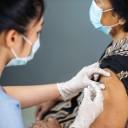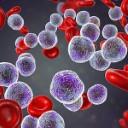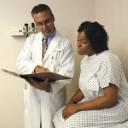-
Risk in the Air
Air pollution can increase a person's risk of developing cancer, a burden that isn't shared equally in every neighborhood.
by Jon Kelvey
-
The Individual Sphere of Influence
Can discussion of health inequities lead to actionable change?
by Marci A. Landsmann
-
Building COVID-19 Vaccine Confidence
Experts discussed how the cancer community can share accurate information and increase confidence in COVID-19 vaccines, both among people with cancer and the general population.
by Kevin McLaughlin
-
A Drive for Diversity
African Americans are underrepresented in the Be The Match bone marrow donor registry. Patient advocates are working to change that.
by Jon Kelvey
-
Physicians Underestimate Severity of Radiation Side Effects
Breast cancer patients' symptoms after radiation therapy may go underrecognized, especially if these patients are Black or younger in age.
by Marci A. Landsmann
-
Why Do African Americans Have Increased Breast Cancer Mortality?
Socioeconomic factors and racism can lead to poorer health outcomes for Black Americans. Genetics may also be a factor behind increased mortality rates.
by Marci A. Landsmann
-
The Return to Work
What happens if your workplace reopens before you're ready to return or you're an essential worker? For some people who have been diagnosed with cancer, accommodations may be possible.
by Jen Tota McGivney
-
COVID-19 Exposes Health Inequities
At a symposium held during a virtual meeting of cancer researchers, panelists discussed the disproportionate impact COVID-19 has had on Black and Latino Americans, as well as members of other minority groups.
by Kevin McLaughlin
-
Pushing Progress Forward
NCI Director Norman E. “Ned” Sharpless addresses disparities and maps out plans for the future amid “profound upheaval.”
by Kevin McLaughlin
-
Embracing Palliative Care Sooner
Studies show the benefits palliative care can provide to advanced cancer patients, but also highlight inequities in access.
by Jen Tota McGivney
Cancer Talk
Treatment Combination Improves Survival in EGFR-positive Lung Cancer
Adding chemotherapy to targeted therapy improves outcomes for people with advanced EGFR-positive non-small cell lung cancer.
by Sandra Gordon
Lessons From 20 Years Living With CancerMultiple myeloma survivor Jonathan Gluck reflects on uncertainty, and the scientific progress that has kept him living with cancer for more than two decades.
by Eric Fitzsimmons
The Enduring Importance of Cancer Disparities ResearchOpening session from AACR conference highlights how perseverance and adversity have informed cancer disparities research over the years.
by Eric Fitzsimmons
Most Cancer Survivors Don’t Meet Healthy Diet GoalsDespite research linking fruits and vegetables to cancer survival, many people do not change their eating habits after diagnosis.
by Darlene Dobkowski














